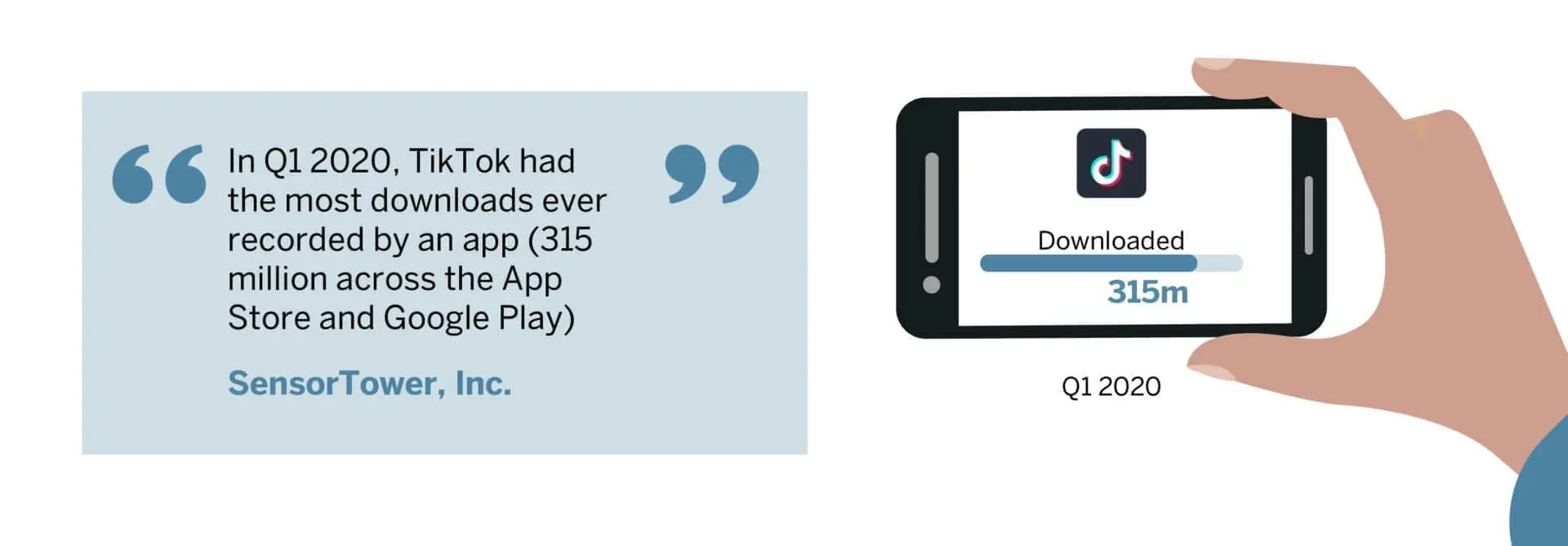US President Donald Trump claimed that TikTok is a threat to US national security because it collects huge volumes of user data that could in theory be accessed by the Chinese state. An executive order then required ByteDance to sell TikTok’s global operations (outside China) to a US company or face being banned from operating in one of the world’s biggest markets. TikTok, which rejects Mr Trump’s claims, has said, among other things, that the order is a misuse of the International Emergency Economic Powers Act.[mfn] https://newsroom.tiktok.com/en-us/tiktok-files-lawsuit[/mfn]
Weeks of intense speculation regarding potential buyers included Microsoft, which seemed like the early favourite; Twitter, which seemed too small to make such a deal; Oracle, whose initial interest seemed puzzling because of the company’s operational focus on databases and applications, rather than videos and social media; and Walmart, which also initially didn’t make much sense given its focus on e-commerce. Last week, a “blessing” was given to ByteDance’s proposed deal with Oracle and Walmart.
However, the deal is far from straightforward or a forgone conclusion. Issues remain over who will own and control all manner of assets, including data and technology. Even before the latest update was announced, a former director at ByteDance told Third Bridge Forum that the central algorithm that has driven the success of TikTok is “incredibly valuable” and that, in any sale, “no suitor is going to get that.” While TikTok’s valuation estimates have ranged between USD 30bn and USD 70bn, we also heard that “there is no revenue that supports that”, at least currently. This was always going to make this deal perplexing, the specialist said, and relinquishing control of the algorithm would be a “huge competitive disadvantage” for ByteDance.
As part of the current proposal, Oracle would become TikTok’s “trusted technology partner” and a commercial partnership with Walmart is also in the pipeline. Both companies would take part in a pre-IPO financing round in which they could take up to a 20% cumulative stake in the newly established company, TikTok Global. In a statement, Walmart said it has tentatively agreed to purchase 7.5% of TikTok’s new entity as well as enter into commercial agreements to provide e-commerce, fulfillment, payments and other omnichannel services to TikTok Global. Although ByteDance said TikTok Global would essentially remain a company subsidiary (given an 80% stake), Mr Trump has insisted that Oracle and Walmart would have “total control” over the company. We have also noted a reference to four of five board seats being allocated to US citizens.

It’s worth noting TikTok’s significant size and breakaway success. In the US, there are 100 million monthly active users, up by nearly 800% from 2018.[mfn]https://www.cnbc.com/2020/08/24/tiktok-reveals-us-global-user-growth-numbers-for-first-time.html#:~:text=TikTok%20has%20about%20100%20million,million%20daily%20active%20U.S.%20users.[/mfn] And as discussed in an earlier Interview with the former ByteDance executive, ByteDance “has a very specific goal of being a global company,” enabled by its strategic and timely acquisition of Musical.ly in 2017. TikTok has also set down roots in the US, with over 1,500 employees and 10,000 more jobs planned. Moreover, many of the country’s leading brands are already successfully connecting with consumers via TikTok. However, 80% of ByteDance’s revenue still comes from mainland China. “TikTok could choose to leave the US tomorrow and I don’t know that it would have a dramatic impact on ByteDance’s bottom line,” he said.
The Interview that took place before the latest proposal also discussed what potential suitors could bring to TikTok, and vice versa. In terms of what Walmart stands to gain, we heard that a potential deal is an “interesting strategic opportunity in its fight against Amazon.” Douyin, the Chinese version of the app, has a robust, integrated e-commerce platform, mirroring China’s on-demand, “one-tap” culture. “Now what Walmart offers to TikTok, or to the TikTok user base, is really a pretty much national, even to rural markets, distribution opportunity,” the specialist added. However, the fragmented payment processing landscape in the US could make it difficult to execute, at least initially. In July, a former Walmart executive explained how the retailer has been ramping up its online capabilities, including launching Walmart Plus.
Meanwhile, the deal could add another string to Oracle’s bow. This follows Zoom’s recent success in moving a large proportion of its video conferencing capacity to the Oracle Public Cloud.[mfn] https://www.oracle.com/corporate/pressrelease/zoom-selects-oracle-to-support-growth-042820.html[/mfn] Moreover, Oracle is expected to be paid hundreds of million of dollars annually to manage the app’s data. With that said, the former ByteDance executive doesn’t see an obvious synergy between Oracle and TikTok other than “Oracle has cash to burn and it moves them into a different place that traditionally they haven’t been [in]”.
In addition to technology wranglings, other stumbling points associated with the deal have surfaced, such as how to split intellectual property. We have heard one expert question whether it is “even possible for a company like Microsoft or Oracle… to buy a piece of TikTok, given the way ByteDance has structured the product, and the way the algorithm and the data science team, and product team sit in China.”
TikTok’s recent surge also needs some context. Its user base grew dramatically during the pandemic as people took comfort in connecting with others. But “that’s not going to last forever, and now you have other products nipping at the heel of TikTok overall,” the former ByteDance executive said. Additionally, TikTok’s content strategy will need to evolve if it is to “build deeper hooks into the user base,” particularly as rivals Instagram and YouTube roll out Reels and Shorts respectively.
The US-TikTok saga is far from over. At present, the proposed deal involving Oracle and Walmart remains uncertain and the complex technology at the heart of any deal will need careful untangling. The US Department of Commerce has delayed the order to remove TikTok from Apple and Google’s US app stores to September 27 in order to give the companies time to finalise a deal. Meanwhile, a recent opinion piece in China Daily indicates that the Chinese government may not be ready to sign off on the details that have been publicly communicated so far.[mfn]http://www.chinadaily.com.cn/a/202009/23/WS5f6a2445a31024ad0ba7b1c9.html[/mfn]
*According to SensorTower, Inc
The information used in compiling this document has been obtained by Third Bridge from experts participating in Forum Interviews. Third Bridge does not warrant the accuracy of the information and has not independently verified it. It should not be regarded as a trade recommendation or form the basis of any investment decision.
For any enquiries, please contact sales@thirdbridge.com




